Vivisection facts for kids
Vivisection comes from two Latin words: vivus (meaning "alive") and sectio (meaning "cutting"). It generally refers to performing surgery or other experiments on a living animal. Sometimes, people use the word "vivisection" to mean any kind of animal testing. This term is often used by groups or people who are against using animals for experiments.
Contents
What is Animal Testing?
Animal testing, also called animal experimentation, means using animals in scientific tests. Scientists do these tests to learn more about biology, to find new medicines, or to check if products are safe. Animals like mice, rats, fish, and birds are often used.
Why Do Scientists Use Animals?
Scientists use animals for research for several reasons. One main reason is to understand how diseases work in living bodies. Animals can also help test new medicines or treatments before they are used on people. This helps make sure the treatments are safe and effective.
Developing New Medicines
When a new medicine is created, it needs to be tested carefully. First, it might be tested in test tubes or on cells. But to see how it affects a whole living system, animals are often used. This helps scientists learn about side effects and how the medicine works in the body.
Understanding Diseases
Animals can also help us understand human diseases. For example, by studying how a disease affects a mouse, scientists can learn more about how it might affect humans. This knowledge can lead to new ways to prevent or treat illnesses.
Arguments For and Against Animal Testing
There are strong feelings both for and against animal testing. People on both sides care about health and welfare, but they have different ideas about how to achieve them.
Why Some People Support Animal Testing
People who support animal testing often point to the many medical breakthroughs that have come from it. Vaccines for diseases like polio and measles, and treatments for cancer and heart disease, were often developed with the help of animal research. They believe that the benefits to human health outweigh the harm to animals. They also argue that there are not always other ways to do certain kinds of research.
Why Some People Oppose Animal Testing
Many people and groups are against animal testing. They believe that animals have a right to live without suffering. They argue that animals can feel pain and fear, just like humans. These groups often suggest that scientists should use other methods instead. These methods include testing on human cells, using computer models, or studying diseases in people directly. They also question how well animal test results apply to humans.
Animal Welfare and Ethics
Concerns about animal welfare are a big part of the debate. People who oppose animal testing often focus on the ethical question of whether it is right to cause animals pain or distress for human benefit. They advocate for the "3Rs":
- Replace: Use methods that don't involve animals whenever possible.
- Reduce: Use fewer animals in experiments.
- Refine: Make sure animals experience less pain and stress during experiments.
History of Animal Research
Using animals for scientific study has a long history. Ancient Greek doctors like Galen performed experiments on animals to learn about anatomy. In more recent times, especially since the 19th century, animal research became more common as science advanced. This led to many discoveries but also to growing debates about animal rights.
Looking to the Future
Today, scientists are working hard to find new ways to do research without using as many animals. New technologies, like "organs-on-a-chip" (tiny models of human organs) and advanced computer simulations, are being developed. These methods could help reduce the need for animal testing in the future. The goal is to continue making scientific progress while also protecting animal welfare. In Spanish: Vivisección para niños
In Spanish: Vivisección para niños
 | Victor J. Glover |
 | Yvonne Cagle |
 | Jeanette Epps |
 | Bernard A. Harris Jr. |



